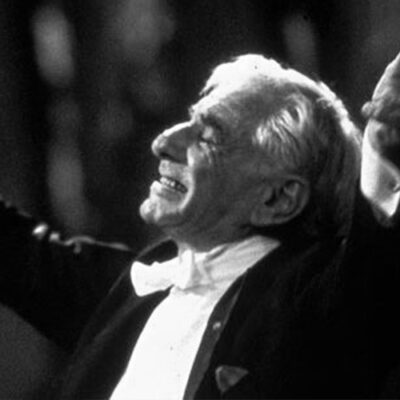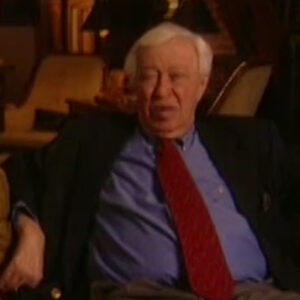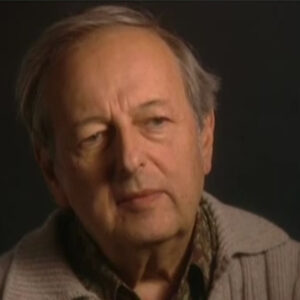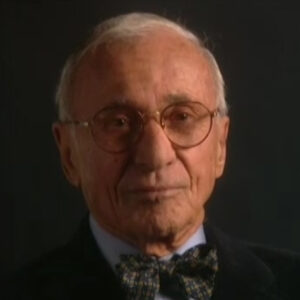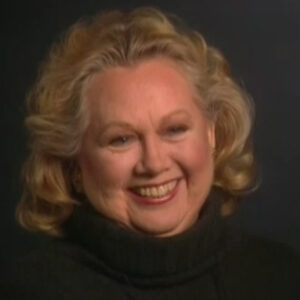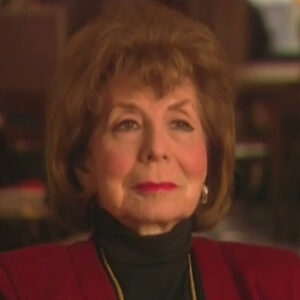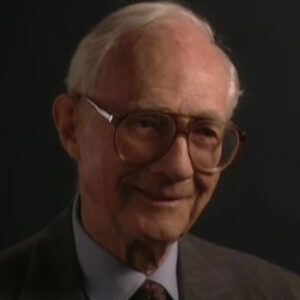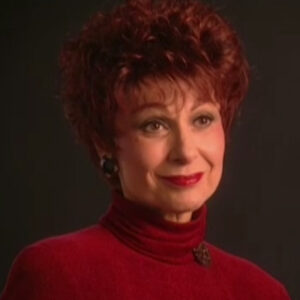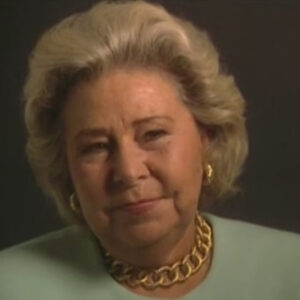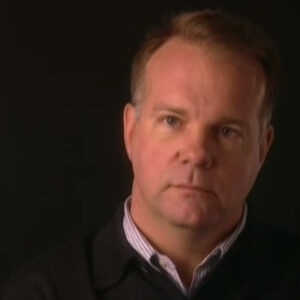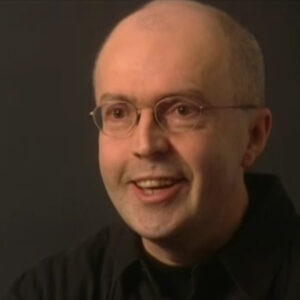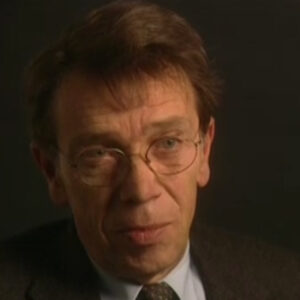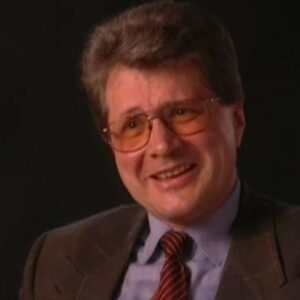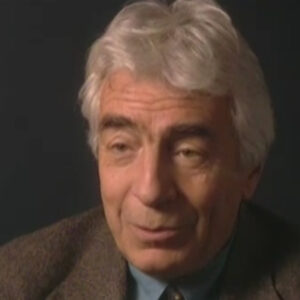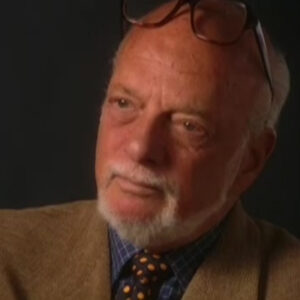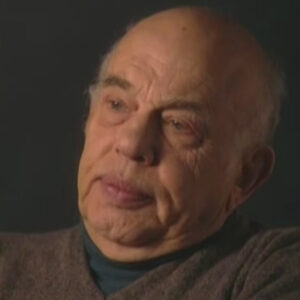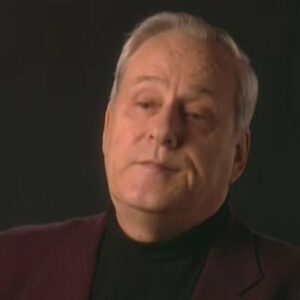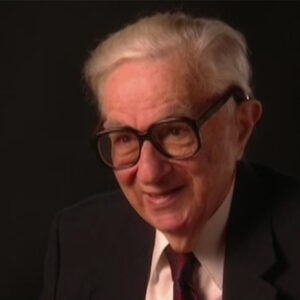Speaker I met Adolph Green, my husband, now, when I auditioned to be Judy Holliday, standby and bells are ringing and I got the job and I got a husband. And after we were dating each other for a while, he took me to a concert at Carnegie Hall that Lenny was conducting. And I sat in the box with Felicia and it was pretty exciting and it was pretty awesome for a little girl from Jersey City to be with Leonard Bernstein, Felicia Bernstein. And we went back to their apartment at the Osborne. That’s where they lived at the time. And for some unknown reason, not so unknown. We all hit it off immediately. I was odd, but I, I think the I think the connection was a sense of humor that Felicia had. Lenny and I was a little irreverent even then. This this is jumping ahead. But it’s the last time I saw Lenny was the night before he died. And we were all over there for dinner at the Dakota and he was in bed and we all were going to sit around the table to have dinner. And he said, I don’t think I can join you. And I went over to the bed and I kissed him. And he says, I know a thousand dollars for a thousand dollars. You want to go home, right? I said, yeah, thousand dollars. I’m going home. And I did go home because I couldn’t bear to sit at the table without Lenny. And I think that started that many years ago. If a party, no matter what it was, was going on too late and I’d say, Lenny, I’ll give you a thousand bucks if I can get out of here. So I mean that I just think of that connection, which is a strong one, when somebody you can tell somebody the truth and be funny with them, even though it’s, you know, the greatest maestro in the world, the most intellectual, most musical, he still got the essence of it. So it’s a big connection. I just realized with Lenny and Felicia, I think that’s why it was not a difficult there was sort of a waiting time and our friendship and our relationships.
Speaker What had I told you about him before you made it? Because I know their friendship were back forever.
Speaker Well, Adolf told me as he told everybody about meeting Lenny at Camp Wauconda and the Pirates of Penzance. And the story, I’m sure, has been told many times you don’t need to hear it again about his friendship with me.
Speaker And I felt, well, I don’t know if he told me at the beginning, but throughout our life together and I’ve been married for, I don’t know, thirty six, thirty seven years, I’ve said to Lenny is your best friend and only friend. And I don’t mean only friend, but I mean it’s like it’s closer than a brother. And I think that Lenny felt that way about it. If that’s a connection that’s extremely deep.
Speaker Yeah, I felt it. Yeah. I wanted somebody to say that because. Oh good. Somebody else. Yeah. Coming from. Yeah. You know what that relationship obviously photographs of the right of.
Speaker Of course, the music I mean, the idea that Adolf knows it probably as much about not about the inner workings of music or harmonies, et cetera, but he knows he knows so much about classical music that Lenny could literally call him and ask him, what recording have you heard of such and such a symphony and what tempo, you know. Yeah, so that’s a big connection, but deeper than just music.
Speaker Well, they were 15, 17 years, right?
Speaker You describe the world of the Bernstine, the world that you then became came into.
Speaker So glittery, glamorous, fun, whatever, you know, I’m sure eroticized to describe what that was like, their life, well, both all three apartments, the Bernstein’s of the Ausborn, first of all, was glamorous because it was full of people of accomplishment. It wasn’t just I mean, if people were there, they were there because of the music. They were there because of the the aura about them. It was no one was ever there for a reason, a social reason. I mean, other people may have thought they were there, but for the Bernstein’s, they were there because they enrich their life or they were part of part of the cultural fabric. Parties were were very easygoing and informal, a lot of terrific food, a lot of drinks. And of course, the center of it was Lennie who was the whirlwind, who just was the whirlwind. And one moment he made you feel like you were the Queen of Sheba, the next moment that you felt like a, you know, a silly little girl or what you were, I think. How do you do that?
Speaker Because he was unedited. No editing process in his mouth or speech, he’d say what ever thoughts? Often he’d say whatever thoughts would come into his head at that moment. I just remember one time that he and I were dancing at the Waldorf. I forget it was after somebody’s performance and he danced with me and we were laughing and having a good time. He said, My God, with a smile like that, I don’t know why you’re not a star.
Speaker And I said to him, I thought I was I was at the height of work and I thought I was doing great. So that was what was going to sit here. I’m his closest friend, you know, he loves me. We’ve talked about everything that well, you know, and it was startling.
Speaker Obviously, I remembered all these years later, you know, so it’s that was what was going through his mind. So he had that.
Speaker But he let the other side was phenomenal to the emphasis in this film is not on his marriage, but by any means his family. But certainly it’s there and in all the pictures and people that police inflation and it’s clear, it was clear and the emphasis is clearly on what was good about it. But it was one part. I mean, the kids have even talked about the split and the effect it had on the family because it’s been intimate biography not to be referred to be taken seriously. Right. And so I’m wondering if you can shed any insight onto into that marriage that you’re comfortable with.
Speaker I think I can only think of a specific time that was one of the lowest points of the marriage and it. Because it was I don’t know, chronologically or what year it was, but Felicia was in a play and she also had had her illness and breast cancer and Lenny wasn’t there. And it was either a Christmas Eve or one of the parties that they used to have all the time. And she had on a wig, not because of her illness, but it was still on from the show. And she was sitting in the middle of this gorgeous apartment at the Dakota. All of the same people were there, but Lenny wasn’t there and. I guess it’s one of the saddest things I’ve ever seen. It’s obviously her illness and all of that because he was the center of her life. On the other hand, no matter what Lenny’s other lives were in my heart and I know Felicia was the center of his if you know, someday, you know, in after the millennium, marriages like that will be able to go on because a certain kind of they’ll know about different sexualities, they’ll know about it. But there’ll be a way to come to terms with it, possibly because they truly not only loved each other, they enjoyed each other. They respected each other.
Speaker They made people laugh. But I think that you can. Live only so long, I think, of Lenny hadn’t left, physically left with someone that the marriage would have not had that period of being broken up. I think they you know, they could have. She could have. I think she could have withstood anything but the public. The public knowledge of Lennie’s other life, I mean, it sounds so melodramatic, but you know what I’m saying?
Speaker And of course, when they got back together again, it was very helpful because it was the last year of eight years of her life and he was a girl. I went there after my one woman show opened and Felicia was in bed and she was very ill. And Lenny and she were sitting there looking at Laurel and Hardy movies. They were watching W.C. Fields. They are white and they were laughing and having a great time.
Speaker In a way, they got, you know, very close that, yes, that often happens.
Speaker Listen, as marriages go, it wasn’t the worst I’ve seen a lot worse that it’s still moving along very close.
Speaker And even though you work together, you work for song at the end of his life. Your relationship was primarily a friendship. Yeah, talk about that friendship.
Speaker What was Lenny like as a friend? Well, first of all, I mean, you were never excluded. In other words, with or without professional, whether or not I was professionally involved with him at the moment, whether or not I was with my husband or the people I was always part of, whatever he did, any trip. My children and I went with Lenny and his children to Israel and, you know, just had the most extraordinary time as most of his close friends did.
Speaker You were part of everything. The king of Denmark. There is good, Lenny. And he said, I won’t go off. Phyllis doesn’t go or he doesn’t go or any friend. So you never felt that you were an appendage or that you were like part of a coterie or part of an entourage.
Speaker You were real friend and he was there to share it with you.
Speaker Talk about that need to share. I mean, I think he wrote something more about it, his need to share so overwhelming. And he actually said that if I wrote a piece of music that I don’t think anybody was going to hear, that piece of music would be irrelevant to me if I saw a beautiful sunset and somebody turned turn to and say waiting for the sunset to sunset wouldn’t exist.
Speaker Those was a need to share all that.
Speaker Oh, I don’t know what I don’t know what the need to share is all about, it’s just something I think that you have and you can’t help it. I mean, I have it. My husband, Adolf, has it. It’s.
Speaker Some people might call it theatrical, but.
Speaker I honestly don’t know, I think it’s something you’re born with. The old cliche, a sound of a tree falling or one hand clapping. It’s just, you know what it is? It’s not so much fun. It’s not. That’s what it is. It’s not fun if you don’t have somebody to tell it to, especially when you’re this exuberant, large personality. It’s no fun if you can’t wake somebody in the middle of the night or call them up or, you know, bellow in their ear. It’s just not as much fun.
Speaker That’s what I think it might be.
Speaker But I think that I mean, we all have our friends and we all want to share and we all have those need for convivial and congenial and community and so forth. But we also sometimes have to be alone.
Speaker Do you think when you that need to? Because I really didn’t I didn’t like being alone.
Speaker Well, but I assume when he worked, you know, he would spend all night, as you well know, writing and working on things. He got so many things done that he had to have spent a great deal of time alone. He wrote every note personally congratulating you or thanking you. And when my book came out, he actually put page numbers and little corrections and words he thought were better than to get that amount of things done. You have to spend a great deal of time alone and your discipline has to be extraordinary. So there were obviously as many hours spent convivial as they were. He spent as many hours alone doing all of these things and accomplishing all of these things. He forgot nothing. If he promised you something, you got it. I told him once that I liked a China pattern at the at the hotel in Salzburg, the great hotel. When he came back the next time, there were plates, dishes, cups. I still have it with a deer on it that he brought back in a suitcase. I mean, that’s this is.
Speaker Hello, Leonard Bernstein. Pick up the cup. You know, it’s this phenomenal.
Speaker That’s what makes them different, I think, from a lot of genius, stellar friends. Because he had such a heart and a real connection, he took it just as seriously that I like the plates as, you know, just a smaller swim.
Speaker So I know that’s why I love the fact that he had seen friends his whole life, you know, because, you know, lots of people on their way.
Speaker Yeah, Rob. A lot of people. Yeah. And he didn’t seem to do that. Can you that that that that was from the you know, I mean, almost his whole life has had the same group of people, not his whole life, but, you know, from the time he became, you know, well out of his life forever ago. Right.
Speaker But he really held on people. That was important. And that’s an unusual thing, is it?
Speaker I don’t know for somebody I the whole world. And I think he also, I think learning like he’s a great puzzle doer and puzzle makers, as everybody knows, not puzzle maker, puzzle doer and game player. And I think that he really had his pieces together. I don’t mean that in any cynical way. And the pieces of his life, aside from his work, which was the center, were his friends, his colleagues and the past also, he knew that that we counted ourselves among his close friends, were honest with him, loyal but straightforward. I think he he liked having all of that because he had a hell of a lot of sycophants and fans and people who just fainted when he went. But the close friends were not like that at all. They kept him in balance like Felecia did.
Speaker What did he do you think he felt he needed to be kept in balance to me?
Speaker I think Lenny was so smart. That he his instincts were so good, he wanted family, he wanted a wife, he wanted good friends, he wanted to have a good time, but not just, you know, in the great halls and with society hostess’s and with people who just listen to every word he said and said, oh, you’re so brilliant. Oh, Maestro, he loved that. Who wouldn’t? But then he he wanted the whole the whole banana and he got it.
Speaker You know what was civil banana. He wanted the bill. He wanted a big thing and he got it. He wanted those other parts.
Speaker But he knew it was you.
Speaker Oh, I think he did. Yeah.
Speaker Susan, I just want to say, oh, yeah, sure.
Speaker Somebody told me yesterday, I’m very happy that because you only got to know Lenny in the last 10 years. Yeah, I don’t know where they were someplace in Europe in the last few years of his life. And they were coming back from something party. And I was very quiet, actually. Just looking out the window, Nelson just said only one thing in the whole ride back to the hotel.
Speaker Something to the effect of one of these days, somebody is going to understand what we’re trying to do.
Speaker And stuff you say, and I did.
Speaker Is that a sign of letting that you think you saw that you knew that the man who was frustrated, perhaps he knew what he was trying to do musically in his life or whatever, wasn’t understood or that he wasn’t interested?
Speaker I don’t I don’t think that Lenny was my opinion that Lenny was. I don’t think he was frustrated in a lot of things. I think he certainly felt frustrated as a composer. He felt that he didn’t give enough time to write very well. Remember the year that he took off or to as a sabbatical not and did not conduct and had his house in Montauk and was wanting to compose and wasn’t able to produce very much after that. That’s when he was frustrated. I think that the writing and the composing, he felt that he hadn’t done enough. But I don’t think that. He was frustrated as far as his effect on the world or his conducting or his political activism. He never shirked from any of those things. I mean, he didn’t he never waited. I don’t think he had no regrets. I’m sure you’ve heard this. But he always used to say to me and to everybody else, I’m not going to be wheeled around in the park. And he wasn’t I think he always said I’d had, you know, a great life, whatever happens. I mean, I ate too much and drank too much and smoked too much and party to party. That’s not my favorite word. But he was up to much. But I don’t think that he had I don’t think he had great many regrets except for composing. I mean, that’s my own feeling. Did he talk to you about composing frustration? Well, he always he only talked about I haven’t done enough work. I haven’t written enough. I haven’t I’ve wasted time doing this. He didn’t waste very much time, to be very honest.
Speaker But he was caught up with things. And of course, Felicia always felt that he was caught up too much with too many appearances, stuff in the later years of his life when he could have been composing, she felt the same way. So that’s the only thing that I.
Speaker I want to tell you about the ride home after his last concert in Tanglewood, I went home in the limousine together from the Berkshires. It was Shirley, Prinstein and Lenny and myself. And he was really exhausted and he was quite ill, but he was adorable. And he put his head. They were still both smoking, Cherilyn Lee puffing away, you know, with Thatta and then put his head in my lap. It’s a long ride.
Speaker And he said, Tell me a story. So I made up the story all the way home about people who are half animals and half humans. And he loved it so much. He’d say, well, then what did they do? You know, I was just making this up. It’s a goat head in a man’s body said, how do they go to the bathroom?
Speaker He was exhausted and smoking. How did they make love? I was just that we just had the best time all the way home.
Speaker That was the nature. I think that that was last ride home.
Speaker Let’s go back and talk about the fun, because, I mean, I think we’re trying to tried to capture that dinner and but I don’t have I mean, I think it’s captured that. Can you give me a couple of really good stories?
Speaker Just, you know, that sort of zany, fun person was.
Speaker I’m the worst anecdote. Listen, I really am the worst story, remember, in the world.
Speaker Yeah, I just I can’t think of a story I’m sorry.
Speaker Yeah, was the Bernstine I know this is the case.
Speaker Oh, this isn’t a story, but you have the movie. Whatever happened to Felicia Montealegre? Yeah. Oh. So that can show you. I mean, first of all, he was so terrible.
Speaker He was such a lousy actor in that Felicia and I are the sisters where Joan Crawford and Betty, they talk about that top of that, the making of that.
Speaker Well, that whole movie, Steve Sondheim always used to do home movies with the Bernstine. And one year I can’t remember what Felicia’s idea my idea is, doesn’t matter. We decided to do a takeoff on whatever happened to Baby Jane, but it was called whatever happened to Felicia. Montealegre and Felicia played the beautiful sister, the beautiful, obviously blonde sister who was the concert pianist in our version. And I was the dark, ugly sister who wanted to get to be the concert pianist.
Speaker So it was a basic picture. I took banana peels and threw them on the floor until she slipped, fell, broke her hip and had to be in a wheelchair. And I became the glamorous concert pianist and Lenny was in it. And he was so terrible as an actor that Steve, who was directing, would really have to say, Lenny, what do we do? I mean, we didn’t have much time, but we laughed so hard and then aid office the day his ex machina in it, we just had the best time. And I think we did it within 24 hours up in Connecticut at their house and then trying to get the scene where we pushed the wheelchair into the pool and kill him. Oh, it’s terribly funny, but that’s where his sense of fun, he was more excited about that. He also was very upset that he didn’t have a bigger part and that it was so terrible. It’s coming back to me. He comes with a guitar, something he’s the terrible strange. It’s a mixture of Tennessee Williams. And, you know, and Robert Aldrich at all is the worst it is there. He was just terrible acting on it. Oh, that well, that’s a huge side of him and all of us. What a good time we have with it. It’s pretty funny, too. Oh, yes. I think the part he was upset. He didn’t have a bigger part and he and we all would yell at him to give him directions. LEIDY It’s too obvious we do it, but he just loved it. I think he would have loved to have been an actor. I’ve seen that screen test. I bet you have that. You’ve seen. I have where?
Speaker Adolph will be able to remember where. Yes, I’m pretty, yes, I’ve seen it. Unless I drift, I think I’ve seen it. That would be wonderful. Yes.
Speaker We have that every effort has been made to find nobody here.
Speaker Well, don’t take my word for it. I may be confusing this with something else. I think that I saw either the screen test photograph from it or I dreamed it in any event. Yes. Yes, because he’ll remember it, you know, because we’re just talking about it the other day. And I can’t remember in what context. Yeah.
Speaker We always, you know, actually, he didn’t always end up at the piano at all, but he became the focal point. People would obviously come in and talk to him and pay homage. And very often, though, he would like to get into a very long discussion and a very intimate, you know, one on one discussion with somebody may not have been the president who might have been there or, you know, or a world leader, but it might have been just some another musician or could have been just a friend or anybody. And he could get into very long discussions because he didn’t like he wasn’t big chit chat. He wasn’t small talk at all, not remote small talk. I mean, he’d certainly acknowledge people and stuff, but he wasn’t a small talk person at all. So he’d been a long talk. There were always lots and lots of people, lots and lots of very good food and beautiful flowers. And Felicia was like a princess in her own corner with her own people coming around to see her and.
Speaker There are a lot of South American women will have to change over time, you got to know them, I guess, in the 50s, right?
Speaker Yes, the end of the 50s and in was there the changing atmosphere from the 50s West Side Story.
Speaker All this money was spending most of his time. You want to know full time work history? Absolutely.
Speaker I didn’t I didn’t know him. I didn’t meet him till the end to those were over with that store. And, Candy, that was it was really the end of the 50s. But I knew a really when that was the orchestra. And so there were people from the Philharmonic. There was whoever the soloist would be, and that would be great. So it was Rostropovich and whoever you can think of who was musical and sensational at the time, uh, political people, movie stars. And I don’t think that they’re entertaining change that much. It was always the swirl of those people, plus the friends. Plus, obviously, plus rather informal people of all ages, lots of children. I think it’s sort of stay the same. Were you involved in politics? And Lenny and Felicia. All right, well. By a stroke of luck, I wasn’t at the dreaded Panther Party, Felicia had called the end of that day and said, Do you want to come over? I’m stuck doing this something or other party. And the last thing on Earth I want to do is get out of bed and come to a party out of me politically, just the whole idea of it. I certainly shared his political views in almost every instance.
Speaker And we all worked on the campaigns of Carter Kennedy, a very big Kennedy supporters, all of us, and as was he. And the Kennedys loved him with good reason and he loved them. So, yes, we shared a lot of political activism, but the famous night, I wasn’t there, but they sure did that by him. With all of that, they blame them for just following their. Intent at the time, and of course, it’s turned out to be everything that they believed, every single thing that they talked about was true. They were being set up.
Speaker His funeral cortege, obviously, we were in one of the cars with the family and we went out to Brooklyn and all along the way there were tons of people, but there were construction workers, all of us saying Lenny and stuff. It was pretty.
Speaker Affecting.
Speaker I don’t know if there’s any other conductor or great icon who’s been called by his or her first name.
Speaker They’ve been called Grétar, you know, so I I think one of the things about him was his teaching ability and his karass charisma on television when he was on television. The audience knew him through his eyes and through his ability to just he leapt across the screen. And that may have had something to do with the fact that you didn’t have to be classical music lover or necessarily a musical theater fan to absorb Lenny, to know him and to think he was part of your life. He was communicating. He was a star. I mean, that’s a whole other part of him. Television part in the more people saw on television, obviously, than in the concerts or anyplace else. And he came across, he could have his own sitcom and he would be a huge star. He has he had the ability to come right through that screen.
Speaker That was a big part of it. Did you what did you watch? I’m curious, did you ever see the young people’s concerns when you were there, was before you? I never saw the young people’s concerts live. I just saw I’ve seen the tapes of them.
Speaker What’s the most revealing thing when he ever said to you, huh?
Speaker Oh, my.
Speaker I’m not sure I know.
Speaker It’s very I was working in Connecticut, this after Felicia died, I’m not sure this is the most revealing thing he’s ever said, but and I was staying overnight at his house, at their house in Connecticut. And I, of course, wanted to go to sleep. And he wouldn’t let me. He came up into the bedroom. I was sleeping and not in Felicia’s bedroom, somebody else’s. And he came and sat at the end of the bed and he talked and he just talked a lot about how much he missed her. I mean, all those obvious things. But he was like some guy that night. He wasn’t like Lenny or he was like Felicia’s husband. He was like some guy. And one thing he said, I think maybe I’ll say it about her. He said, you know, I don’t understand where I went wrong.
Speaker And I don’t think he said where I went wrong, I don’t I don’t want to misquote him, the essence of what he was saying is I don’t understand what went wrong. He didn’t say what went wrong, but he didn’t quite understand why.
Speaker It didn’t work out better. I mean, that’s my reading of it, I don’t want to read things into it about Felicia and about how she was so unhappy at so many points in life and so angry. I totally identify with that. I think a lot of women do about her love, her feelings for him, her frustration. And I don’t think he quite understood how deep that went and.
Speaker I may be making up this whole thing now not but you know what I’m saying.
Speaker Yeah, I don’t get to what I think he thought of me because, first of all, I’d had the same thing Felicia had in terms of illness, mean I’m fine. And we were talking about it because it was soon after I was working and I was going through chemotherapy and I was in the bed. I was fine, totally fine stuff that we talked about the illness. But I think that he was just making a connection to a woman, not unlike Felicia, in terms of being married to someone who’s well known and sort of cuckoo and all of those things and. This is making any sense that I think if you ask my husband, he would not understand why I’m angry sometimes and frustrated I’m not equating him with Lenny and I think that’s what he was talking about. He knew because Lenny knew the underneath part of all of this stuff.
Speaker And I think he was saying what, you know, what happened, hey, what happened, do you think he was saying why?
Speaker Why was I why didn’t I understand it better at the time? Why didn’t I do something different?
Speaker I just I don’t know if it is subjective that I think it’s you look back on a life and if if your wife’s friend is there in the bed, you know, and you’re chatting with her and and I reminded him not of her because of the way I am, but just because of the insides of us. He was thinking what what went wrong and.
Speaker I think that I think that’s what that was about, that what went wrong, what was it? What is it? What happened?
Speaker He many people have talked about the fact that he never really forgave himself for inflation.
Speaker Do you think that’s true? Do you think he felt responsible? I think he’s written that. Yeah, but what effect did it have on really more important?
Speaker What was the the consequence of the pain that he felt about that after she died for the rest of his life in terms of him, in terms of his perspective? You changed?
Speaker I’m not sure that changed him. I don’t really know whether anything whether it changed him. I do know that he equated his illness towards the end and, you know, when the illnesses started tumbling.
Speaker Maybe too much pop psychology, but it’s something because I have been through it, you feel in some way, if you get ill, that you’re being paid back or that you deserve it because you’ve caused somebody’s unhappiness. I’ve been through that. So I can say that from my own point of view, I don’t believe that that’s true. But I’m not I wouldn’t be surprised if he didn’t feel that paid back is the wrong word. But if he didn’t feel that something that he was going through was a consequence of something he may have felt he did with Felicia. But of course, it’s not true because. But I think you feel that way. I felt that way. So I put it on to him that he possibly felt that way. He talked about it, not talked about it in so many words.
Speaker Exactly.
Speaker Yeah. That also that you deserve not deserve it. Deserve it. I got it because. She had it or he had it or or I was too angry or I was too this I mean, you put a lot on yourself when you go through a major illness.
Speaker Were you angry with him when he left you?
Speaker Oh, yes. So I was very angry.
Speaker How did his friends and your family respond to this?
Speaker Everybody was angry.
Speaker But also, you understood in a way that Lenny had feelings and he had desires and he had needs and he didn’t want to be to to to to judgment because he was supposedly also grown up about these things. But, yeah, we felt we felt terrible. And we I mean, you know, if one had to choose, you never would. I obviously, in the loss of friends would have gone. Felicia was nothing to discuss. In other words, if she were someplace and he and she was excluded and Lenny was someplace, it wouldn’t matter if it were. The biggest thing in the world with be with Felicia, I think most of her friends felt that way. I know that they did. And it wasn’t choosing things just because the big where the action is wasn’t necessarily where you wanted to be.
Speaker And you probably don’t really know the answer to this because nobody can. But you’re comfortable talking. That was what it was that prompted you to check that out.
Speaker That I. I can’t imagine what prompts anybody. I think you worry about your age. You worry about you’re not getting what you want out of life. I mean, it happens to a lot of people, much less famous than Lennie’s. That was just public, that’s all. I mean, I felt a million times like everybody feels like I’m this is not happening, folks. Get me out of here. You know, I’ve got so much life to live. Let me do let me follow this. Let me follow that. And it’s not that abnormal a a move for me.
Speaker Do you think he felt that this was somehow going to rejuvenate his life, rejuvenates creative energies and was he was love?
Speaker You know, I don’t even really remember. What about his you know, his what he was doing at the time with creativity? I don’t know what made him feel.
Speaker And I think a lot of people would like to take a trip, you had a lover, you know, get a new dress, the new hat if you’re feeling down, and he just didn’t expect exactly anything like it.
Speaker I also think he cared very much about the person he was with the time, the young man.
Speaker There were some, but they also apparently, according to Jamie that year, they tried to disaster it, but wait for a while, I’m sure, and there’s some misunderstanding about that.
Speaker People think you people in the press or the books talked about a decision to come home as being connected with finding out that she was ill and it was not you know, maybe you could clarify.
Speaker I don’t know. I can’t because I’m very bad at chronology.
Speaker But I know he didn’t come back to her because she was ill, because he also he was gone. He was with her when she got ill, but then he was gone after she was better. So he I’m not good with chronology. I’d really have to, you know, look it up. But that was not the reason that he came back. Somehow he was gone, the thing that I discussed before happened after she’d been ill and gotten better and he was not there.
Speaker So I don’t know, you have to look that up. No, she had a right and she got right. And then she got ill again. Right now, I remember I was there, but it was during that period, though, between the time that she was ill, the first time that he was also gone. Yeah, I don’t I don’t I just I don’t know either I have to laugh. Yeah, it was before they had discovered the tumor, right?
Speaker Yes, because it was it was where her first was. Because it was before Jamie’s graduation. Yeah. Yeah. First.
Speaker Yeah. Because you would you you’ve told the story. Yeah.
Speaker Felicia called me and met her at a coffee shop and she told me that they had found a lump in her breast, but it was in May and Jamie was going to graduate from Harvard. So she said that she didn’t want to have this operation or anything or do anything to spoil Jamie’s graduation or tell anybody, which indeed I’m not sure whether she told Lenny then or not. She I’m sure she did. But she didn’t tell the children, to my knowledge.
Speaker And Jamie graduated. And then Felicia went into the hospital and they found out it was malignant and thus began her stuff.
Speaker And Jamie was very angry that night, not knowing about it that day because they act so peculiar. She of, you know. Really. Yeah, she’s I mean, up at the graduation. Yeah. I mean, she’s talked about yeah. They were acting strange and she didn’t know what was going on.
Speaker I kind of it’s a very hard thing to do because you’re damned if you do, damned if you don’t. You don’t want to spoil your kid’s graduation. On the other hand, it’s very hard to be normal. I mean, what’s normal, you know, when that’s hanging over your head? Because I had exactly the same thing. That was the whole point of why, you know, wrote about it, because it’s exactly the same month and it was exactly the same for a kid graduating from Harvard. I didn’t want to spoil it was exactly it was just too eerie and weird with the mammograms under the in the in the you know, the thing going it was just an identical story. That’s why we talk before about Lenny and feeling about illnesses. Things are related. You just you make these connections when things like that happen to you, too, or not, you make them.
Speaker What would you like to say about Lenny, Lenny and Felicia or I have asked you to talk about that you would like to be part of this record. Oh, dear.
Speaker Oh, I guess the most important thing to me, the most important thing is the.
Speaker The hole in my life, my husband and my children’s life, that the passing of Felicia and Lenny has made.
Speaker Felicia, friendship and everything else, and Lenny, not only this deep friendship, connection to music and a connection with something so big that you’ll never.
Speaker You’ll never know the likes of something like that again or someone like that again, so. It really does leave a hole, so he he was that to so many people. That’s a very big thing to have been, and I’m grateful for his. Friendship and his music and his talent. And I’m glad I was there.

